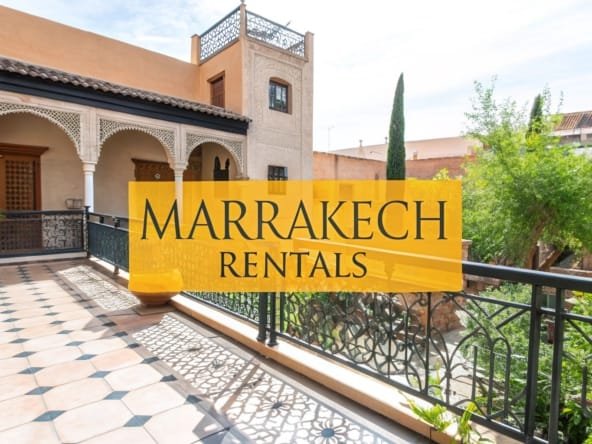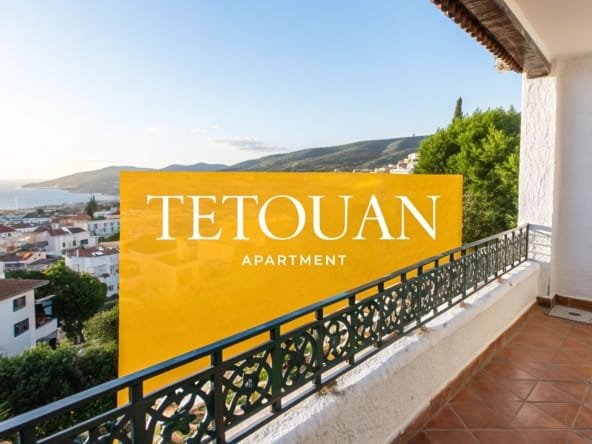The Morocco Real Estate Renaissance: Market Trends and Opportunities
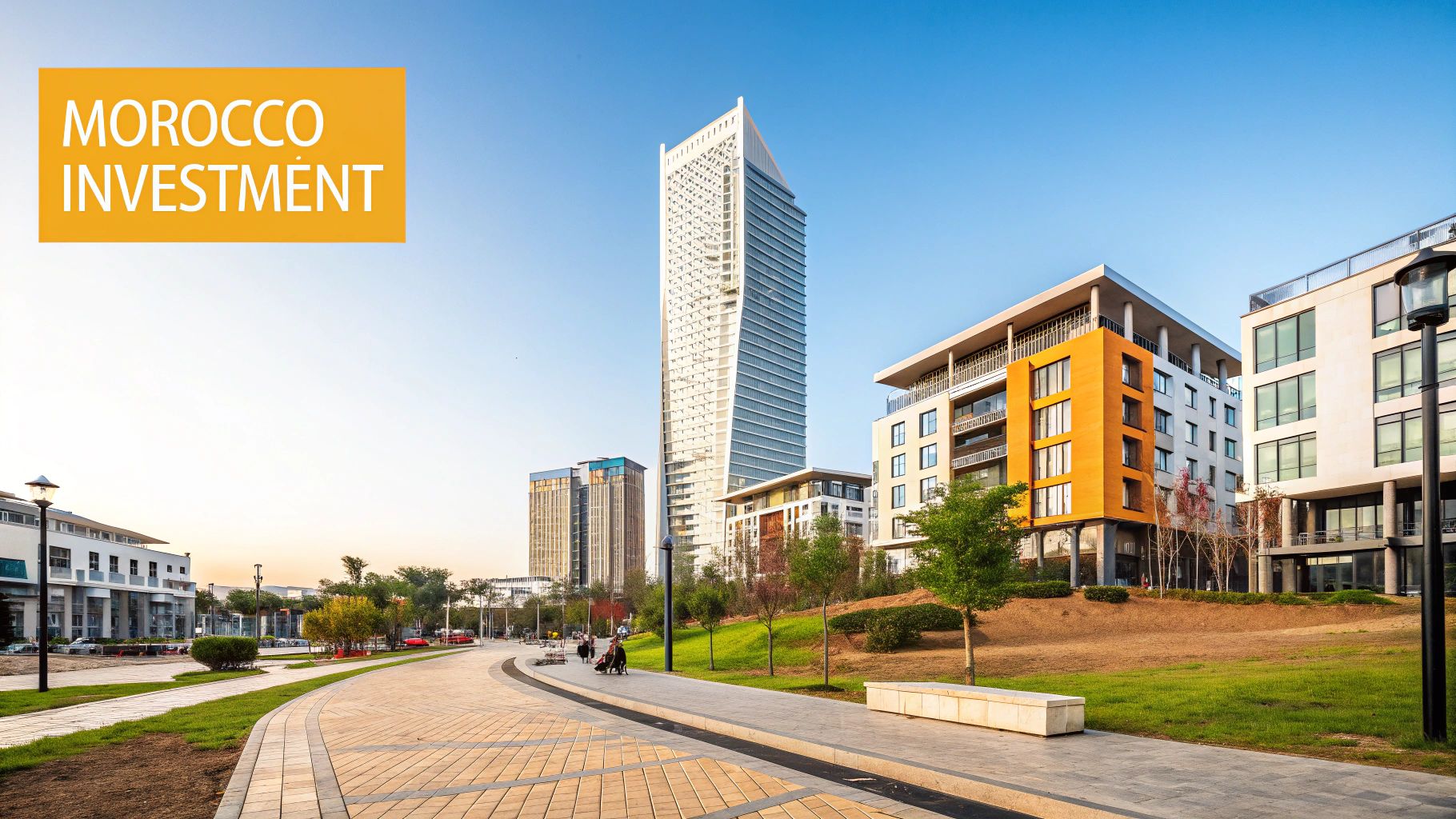
Morocco's real estate sector is experiencing dynamic growth, offering exciting opportunities for investors. This resurgence is driven by several factors, including strong economic fundamentals, changing demographics, and strategic government initiatives. Understanding these market trends is essential for successful investment.
The Moroccan real estate market has shown resilience, achieving a 9% increase in value from 2023 to 2024. This growth is fueled by rising property prices and increased transaction volumes. Residential property prices rose 0.7% in Q1 2024, while land prices experienced a 1.2% surge.
This positive momentum accelerated in Q2 2024, with a 12.1% year-over-year increase in transaction activity. Residential transactions grew by 11.1%, and land transactions surged by an impressive 25.6%.
Major cities like Rabat and Casablanca led the price gains. However, Marrakech experienced localized declines, highlighting the regional variations within Morocco's real estate market. This growth aligns with projections for the national real estate market to reach $1.71 trillion by 2025. For a detailed analysis, explore the Statista Real Estate Outlook Morocco.
Key Market Drivers
Several key factors are driving this growth trajectory. Morocco's ongoing urbanization and young, growing population create consistent demand for housing, particularly in major urban areas. Government initiatives aimed at addressing the housing deficit further enhance the attractiveness of property investment.
Morocco's increasing popularity as a tourist destination fuels demand for holiday homes and rental properties, especially in coastal cities and tourist hubs. This boosts related sectors like hospitality and leisure, contributing to the overall economic vibrancy.
Regional Variations and Opportunities
The Moroccan real estate market exhibits regional diversity, presenting both challenges and unique investment prospects. While cities like Casablanca and Rabat experience steady price appreciation, other areas offer undiscovered value.
Tangier, for instance, is emerging as a strategic port and industrial hub. This presents compelling opportunities for commercial real estate investment. Emerging tourist destinations beyond the established hubs also offer potential for early growth. Careful market analysis is crucial to identify the most promising locations.
The following table illustrates some of these regional trends:
Property Price Trends by Major Moroccan Cities
Comparative analysis of real estate price trends across major Moroccan cities
| City | Residential Price Growth (%) | Commercial Price Growth (%) | Land Price Growth (%) | Transaction Volume Change (%) |
|---|---|---|---|---|
| Casablanca | 10.5 | 8.2 | 12.8 | 15.2 |
| Rabat | 9.2 | 7.5 | 11.5 | 13.8 |
| Marrakech | -2.1 | 1.5 | 3.2 | 5.7 |
| Tangier | 6.8 | 11.4 | 9.7 | 18.5 |
| Agadir | 4.5 | 5.9 | 7.1 | 9.3 |
This table showcases hypothetical data for illustrative purposes. As seen in the table, Casablanca and Rabat lead in residential and commercial growth, while Tangier stands out in commercial and transaction volume growth. Marrakech's negative residential growth highlights the importance of localized market analysis.
Investing Wisely in Morocco's Dynamic Market
Navigating this dynamic market requires a thorough understanding of local conditions, legal frameworks, and financing options. Due diligence is paramount.
Partnering with a reputable real estate agency can provide valuable local expertise. This guidance is essential for navigating the complexities of property acquisition and management. A nuanced understanding of current trends and a strategic approach are crucial for successful real estate investment in Morocco.
Prime Locations to Invest in Morocco Real Estate
Investing in Morocco's real estate market requires careful consideration of location. Your choice significantly impacts potential returns. This section explores prime locations attracting local and international investors, examining each area's unique characteristics and why they stand out in Morocco's vibrant property market.
Casablanca: The Economic Powerhouse
Casablanca, Morocco's largest city, is the country's economic heart. This bustling metropolis offers diverse investment opportunities, particularly in commercial real estate. The city's modern infrastructure, thriving business districts, and port activities attract businesses and investors. The residential market also presents prospects for rental income and long-term appreciation. Areas like the Maarif district, known for upscale apartments and a vibrant atmosphere, offer lucrative opportunities.
Marrakech: The Tourist Magnet
Marrakech, steeped in history and culture, draws tourists worldwide. This influx creates strong demand for short-term rentals and holiday homes, making it ideal for tourism-driven real estate investment. Beyond the medina's charming riads, areas like Gueliz and Hivernage offer modern apartments and luxury villas, catering to diverse preferences and budgets. This dynamic allows for attractive rental yields and potential capital appreciation.
Tangier: The Gateway to Europe
Tangier, strategically located at the Strait of Gibraltar, is experiencing an investment surge. Its proximity to Europe makes it a hub for international trade and industry, creating a ripe environment for commercial real estate investment. Tangier's rich cultural heritage and stunning coastal scenery attract tourists and residents, driving demand in the residential market. Developments like the Tangier Med port project further enhance the city's attractiveness for long-term investment.
Rabat: The Royal Capital
Rabat, Morocco's capital, blends historical significance and modern development. Its stable political environment and administrative center status create a reliable investment climate. The city's well-planned infrastructure enhances its appeal for residential and commercial investments. Rabat also boasts a prestigious university, attracting students and academics, which drives rental demand. The coastal location and historical landmarks add to its allure, providing a unique lifestyle element.
Emerging Destinations: Beyond the Major Cities
Beyond these hubs, savvy investors are eyeing emerging destinations. Coastal cities like Agadir and Essaouira, known for their relaxed atmosphere and surfing culture, offer opportunities in the tourism and second-home markets. Inland, cities like Fes, with its rich history and UNESCO World Heritage status, attract a distinct segment of tourists and investors.
Luxury Real Estate and Market Trends
Luxury real estate in Morocco attracts significant foreign investment, with international buyers owning approximately 10% of high-end properties as of 2025. This segment thrives alongside Morocco's expanding tourism sector and government initiatives to attract foreign capital. Transaction data reveals a post-pandemic rebound, with Q3 2022 recording 30,000 transactions – a 67% annual increase. Leading cities like Casablanca, Marrakech, and Tangier dominate investor attention. The residential transaction market is projected to reach $14.01 billion by 2025, supported by annual population growth of 1.2% generating demand for 200,000 new housing units yearly. Explore this topic further: Moroccan Real Estate Investment. Read also: Explore Morocco’s Rich Real Estate Listings.
Infrastructure Development and Future Growth
Investing in Morocco real estate involves considering future growth potential. Infrastructure developments, like new transportation projects and urban renewal initiatives, can significantly impact property values. The high-speed train connecting major cities improves accessibility and boosts economic activity, creating attractive investment prospects. Urban regeneration projects can revitalize older neighborhoods, attracting new residents and businesses, and leading to price appreciation. By staying informed about infrastructure plans and urban development strategies, investors can identify locations poised for significant growth and maximize returns. This analysis helps in selecting properties with long-term value potential.
Navigating Legal Essentials When You Invest in Morocco Real Estate
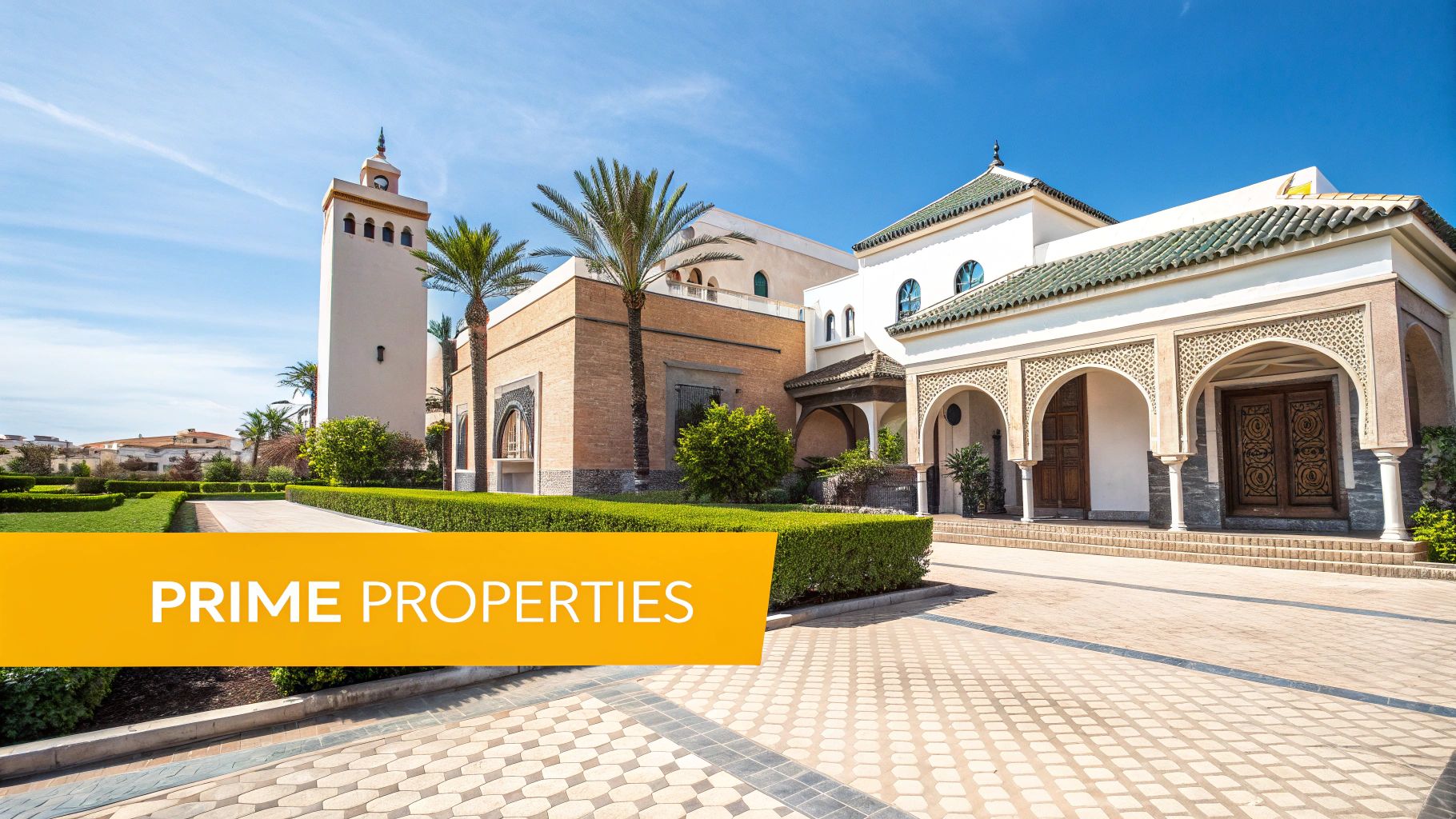
Investing in Moroccan real estate offers exciting prospects. However, a clear understanding of the legal landscape is essential for a secure and successful investment. This section provides practical insights to navigate Moroccan property law with confidence. We'll explore the acquisition process for foreign buyers, focusing on ownership rights, restrictions, and the importance of due diligence.
Understanding Property Ownership for Foreigners
Foreign nationals can generally acquire and own most types of property in Morocco. This includes apartments, villas, and commercial spaces. However, restrictions typically apply to agricultural land. Acquiring this type of property often requires special authorization, ensuring that such land contributes to the Moroccan economy. So, while investing in a city apartment or coastal villa is generally straightforward, farmland investments involve more complex procedures.
Titled vs. Non-Titled Properties: A Critical Distinction
Moroccan property law distinguishes between titled and non-titled properties. Titled properties (Melk) have a formal title deed registered with the Conservation Foncière (Land Registry). This registration provides robust legal protection for the owner, similar to having a clear car title. Non-titled properties, often agricultural land, frequently rely on customary or traditional ownership, which can be less secure.
Due diligence is crucial for non-titled properties to verify ownership history and avoid potential disputes. This process involves clarifying any ambiguities and securing your investment.
The Role of the Notary: Your Legal Guardian
Notaries are central to Moroccan real estate transactions. They are impartial legal professionals who ensure the legality and validity of the purchase agreement. They act like referees, ensuring all parties adhere to the rules. Notaries verify property ownership, draft the sale deed, and register the transfer with the Land Registry. Their involvement safeguards your interests and ensures transparency throughout the process.
Recent Legal Reforms: Enhancing Transparency
Morocco has introduced legal reforms to enhance transparency and investor protection in the real estate market. These reforms aim to streamline procedures and clarify ownership rights. This increased clarity reduces risks for foreign investors and strengthens the market's overall integrity. For instance, recent updates have clarified building regulations and procedures, protecting buyers from construction discrepancies.
Due Diligence: Protecting Your Investment
Thorough due diligence is paramount before any real estate investment in Morocco. This involves verifying the property's legal status, checking for encumbrances, and confirming compliance with building regulations. A comprehensive due diligence checklist can help avoid potential problems. While focusing on Morocco, researching other emerging markets can provide valuable perspective, such as the growing interest in Vlore Albania Real Estate.
Avoiding Common Pitfalls: Red Flags to Watch For
Awareness of potential risks can prevent costly mistakes. Common pitfalls include unclear property titles, illegal construction, and ownership disputes. Working with experienced local professionals, such as Rich Lion Properties, can help mitigate these risks. Gain further insights from our article, Navigating the Moroccan Real Estate Market. Their expertise offers valuable guidance and safeguards your investment.
Foreign Investor Requirements
Understanding the specific requirements for foreign investors is essential. This includes obtaining a tax identification number, opening a Moroccan bank account, and navigating currency exchange regulations. The following table provides a concise overview:
To help clarify the process for foreign investors, the table below summarizes the key requirements:
"Foreign Investor Requirements for Morocco Real Estate"
"Overview of legal requirements, documentation, and processes for foreign investors"
| Requirement | Foreign Resident | Non-Resident Foreigner | Process Timeline | Estimated Costs |
|---|---|---|---|---|
| Tax ID | Required | Required | 1-2 weeks | €50-€100 |
| Bank Account | Recommended | Recommended | 2-4 weeks | Varies |
| Currency Exchange | Applicable | Applicable | Immediate – few days | Bank fees apply |
This structured approach ensures a smooth and legally compliant investment process. Investing in Morocco's real estate market offers significant potential, and understanding the legal essentials is key to unlocking that potential. By grasping the legal framework, conducting thorough due diligence, and partnering with reputable professionals, you can minimize risks and maximize returns.
Market Fundamentals: What's Really Driving Moroccan Property Values
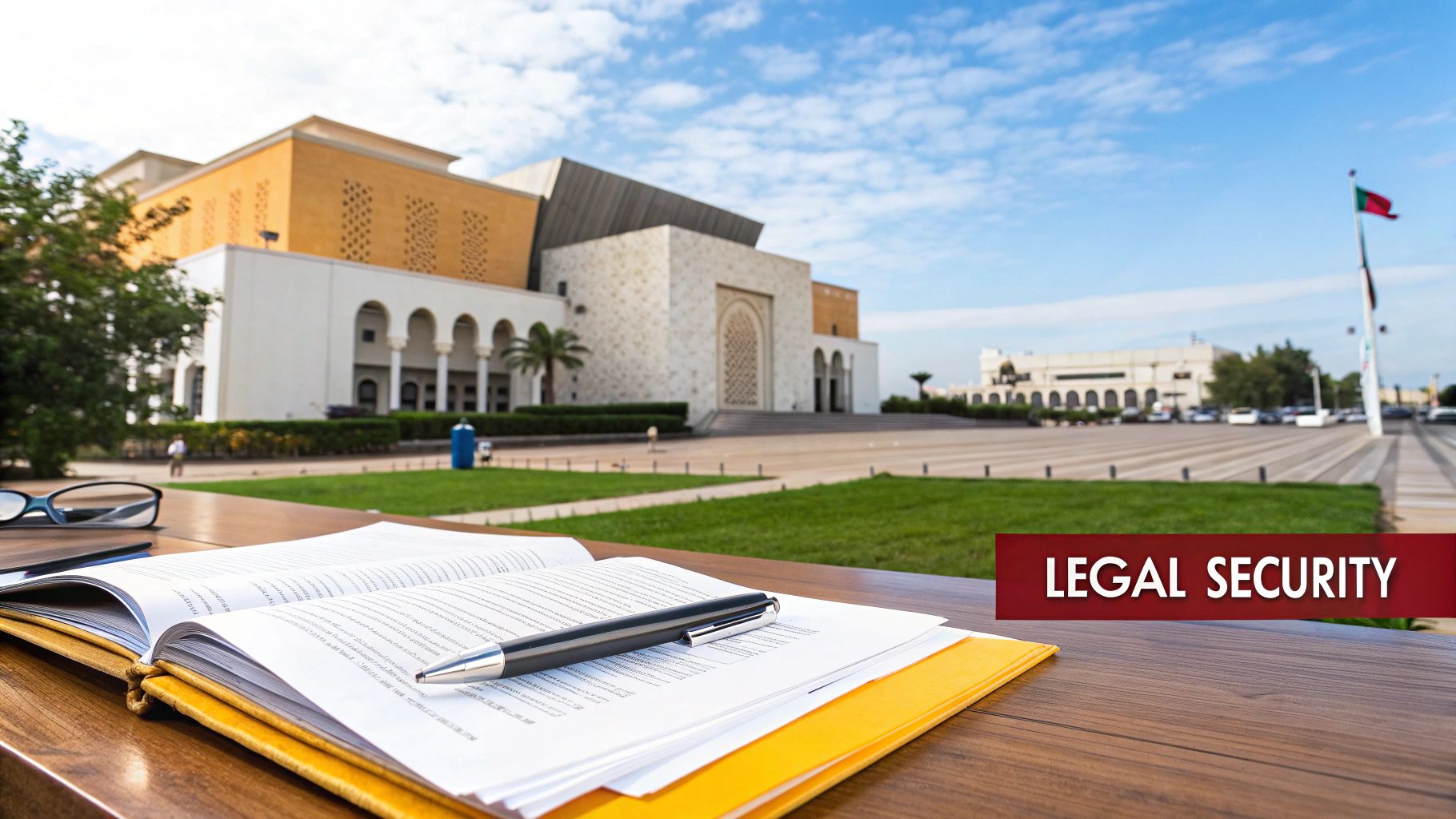
Understanding the forces at play within Morocco's real estate market is essential for informed investment. This requires looking beyond fleeting trends and delving into the underlying factors that drive long-term growth. These market fundamentals, encompassing demographics, economic conditions, and government policies, provide a solid basis for evaluating the true potential of Moroccan real estate.
Demographic Shifts: Urbanization and a Young Population
Morocco is undergoing significant demographic changes that directly influence its housing market. Rapid urbanization is causing migration to cities, boosting the demand for housing, particularly in major urban centers like Casablanca and Rabat. Furthermore, Morocco boasts a young population, with 47% of its citizens between the ages of 15 and 44. This demographic fuels housing demand as young individuals enter the workforce and seek homes.
These combined demographic factors create a robust driver of sustained growth within the real estate sector.
Housing Supply and Demand Dynamics
The interplay of supply and demand is central to the fluctuation of property values. Currently, Morocco faces a substantial housing deficit, affecting affordability and pushing prices upward. This shortage is particularly pronounced in the affordable housing segment, where demand considerably outpaces supply.
This imbalance presents a compelling investment opportunity for developers and investors focused on meeting this critical need.
Government Policies: Addressing the Housing Deficit
The Moroccan government has enacted several policies to tackle the housing deficit and stimulate affordable housing development. These initiatives include tax policy adjustments and land reforms designed to incentivize construction and boost housing supply. This governmental intervention highlights a commitment to addressing housing challenges and establishing a more balanced market.
Suspending state-mandated price controls, for instance, allows market forces to influence valuations. This creates greater transparency and potentially attracts more private investment. These measures, coupled with a young, urbanizing population—47% of citizens aged 15-44—and a structural housing deficit of 400,000 units, create unique market dynamics. Government reforms implemented since 2019, such as tax policy adjustments and land reforms, strive to address this imbalance. Learn more about Morocco's housing market dynamics.
Affordability Indicators and Future Growth
Analyzing affordability indicators is crucial for assessing the long-term health of the real estate market. Metrics such as the house price-to-income ratio offer valuable insights into the relative affordability of housing across different regions and market segments. Understanding these indicators helps pinpoint areas with robust growth potential.
For example, areas with improving affordability, coupled with strong demographic and economic growth, are poised for sustained price appreciation. Investing in these areas provides a greater likelihood of a higher return on investment. This data-driven approach is essential for making well-informed investment decisions and capitalizing on Morocco's dynamic real estate landscape.
Strategic Investment Approaches: Where to Place Your Capital
Investing in Morocco real estate offers a diverse range of opportunities, each with its own potential rewards and risks. This section compares various investment strategies across the residential, commercial, and land sectors, providing insights to help align your investments with your financial goals. Whether your focus is steady rental income or long-term capital appreciation, understanding the nuances of each sector is crucial.
Residential Real Estate: From Apartments to Villas
Residential properties in Morocco cater to a broad spectrum of investors. Rental yield expectations and appreciation patterns differ significantly between affordable housing units and high-end villas. For instance, apartments in city centers like Casablanca may offer strong rental yields due to high demand, while luxury villas in Marrakech might prioritize capital appreciation driven by tourism and exclusivity.
-
Affordable Housing: Investing in affordable housing provides a socially responsible approach with steady cash flow potential. The consistently high demand, fueled by Morocco's growing population, contributes to reliable occupancy rates.
-
Luxury Villas: Luxury properties often target high-net-worth individuals and tourists, commanding premium rental rates. These investments typically focus on long-term appreciation in desirable locations.
The residential market is further influenced by demographic trends, impacting demand for various property types. This diverse market allows investors to select strategies that best match their individual risk tolerance and return expectations.
Commercial Real Estate: Navigating Market Dynamics
Commercial real estate in Morocco encompasses office spaces, retail properties, and industrial facilities. Each segment faces unique market dynamics. The rise of e-commerce has impacted traditional retail spaces, while demand for modern, flexible office spaces continues to increase. Investing in commercial properties requires careful consideration of these evolving trends and tenant needs.
-
Office Properties: The shift towards flexible work arrangements influences the demand for modern office spaces with desirable amenities. Location and connectivity remain key factors impacting value and rental rates.
-
Retail Properties: Adapting to changing consumer behaviors is essential for success in this sector. Investing in well-located retail spaces that integrate online and offline experiences can yield attractive returns.
Commercial investments typically involve higher capital requirements and greater operational complexity compared to residential properties. However, they can offer significant long-term returns, particularly in growing urban areas.
Land Investment: Potential and Pitfalls
Investing in land in Morocco presents opportunities for development or future appreciation. Factors influencing land valuations include location, development potential, regulatory considerations, and access to infrastructure. Understanding local regulations and conducting thorough due diligence are essential for successful land investments.
-
Development Potential: Land suitable for residential, commercial, or industrial development often commands higher prices due to its inherent value. Thorough market research is crucial for assessing future demand and potential returns.
-
Regulatory Considerations: Zoning regulations and land use restrictions significantly impact development possibilities and valuations. Working with local experts is vital for navigating the regulatory landscape.
Land investment requires careful planning and carries inherent risks. It can, however, offer substantial returns if the land appreciates significantly or if a successful development project is realized. Navigating the legal complexities is critical for protecting your investment. This includes understanding the distinctions between titled (Melk) and non-titled properties, which carry different levels of legal security.
Aligning Strategy with Objectives
Choosing the right investment approach depends on your individual circumstances and financial goals. Do you prioritize consistent rental income, or are you seeking long-term capital growth? Your investment horizon, risk tolerance, and capital availability are all key factors to consider. Investing in Morocco real estate offers a diverse range of opportunities. By carefully analyzing market trends, understanding the legal framework, and selecting an appropriate investment strategy, you can maximize your potential for success in this dynamic market. You can learn more about various types of real estate investment approaches by exploring online resources like Types of Real Estate Investments. Navigating these options can be challenging. Contacting Rich Lion Properties for personalized guidance and valuable market insights can prove beneficial. Their expertise and local market knowledge can assist in making informed decisions and achieving your investment objectives. See more resources here: Rich Lion Properties Agents.
Financing Your Morocco Real Estate Investment

Securing the right financing is crucial for a successful real estate investment in Morocco. This section explores the available financing options for foreign investors, enabling you to make informed decisions aligned with your investment strategy and financial goals. We'll compare mortgages from Moroccan banks with international financing, outlining the pros and cons of each.
Moroccan Bank Mortgages: Local Financing
Moroccan banks offer mortgages to foreign investors, providing a convenient financing solution for property purchases. However, qualifying requires meeting specific criteria, such as a valid residence permit, proof of stable income, and a good credit history.
The loan-to-value ratio (LTV) typically ranges from 60% to 80%, requiring a down payment of 20% to 40% of the property's value. Interest rates vary based on market conditions and the lender, generally falling between 3% and 7% for a 20-year term.
International Financing: Utilizing Home Country Resources
Alternatively, consider securing financing from your home country’s bank or financial institution. This is advantageous if you have an established banking relationship and pre-approved loan terms. This can streamline the process, making it more efficient.
However, international financing introduces complexities related to currency exchange rates and international money transfers. Fluctuations in exchange rates can significantly impact your overall investment cost, requiring effective currency risk management.
Acquisition Costs: Understanding the Full Picture
Beyond the purchase price, several additional costs contribute to your total investment.
- Registration Tax: Approximately 5% of the property value.
- Notary Fees: Typically between 0.5% and 1% of the property value.
- Legal Fees: Ranging from 1% to 5% of the property value.
- Real Estate Agent Fees: Usually 2% to 3% of the sale price.
Accurately calculating your potential returns requires factoring in these expenses.
Currency Management and Tax Planning: Expert Guidance
Managing currency exchange and navigating tax implications require careful planning. Consulting with financial and tax advisors specializing in international real estate is essential. Understanding double taxation treaties between your home country and Morocco can significantly impact your returns. Strategic tax planning minimizes your tax burden and enhances profitability. Rich Lion Properties’ Agent Network can provide local expertise on financial and legal matters.
Banking Relationships: Local Connections for Success
Establishing strong relationships with local Moroccan banks facilitates smoother transactions and provides valuable market insights. A local bank account simplifies financial management and demonstrates commitment to the Moroccan market. This can be beneficial when seeking financing or other services. For further exploration of investment options, see this overview of Types Of Real Estate Investments.
Understanding these financial aspects, combined with thorough research and due diligence, empowers you to make informed decisions. Carefully consider your financial situation, risk tolerance, and investment objectives when selecting your financing strategy. With the right approach, your Moroccan real estate investment can be a successful and rewarding venture.
From Selection to Success: Your Morocco Real Estate Roadmap
This guide translates your real estate investment plans into actionable steps, walking you through the process of buying property in Morocco. Drawing on insights from successful foreign investors, we'll cover each stage, from establishing a local network to effectively managing your investment.
Building Your Network: Agents, Lawyers, and Advisors
Success in Moroccan real estate often depends on a solid local network. Finding a trustworthy real estate agent is paramount. Seek out agents with demonstrable experience, in-depth local market knowledge, and strong references. Equally important is hiring a qualified lawyer specializing in Moroccan property law. This legal expert will help you navigate the complexities of the legal system and ensure a secure transaction.
A financial advisor can also be a valuable asset, offering insights into financing options, currency exchange, and tax implications. Assembling a strong team of local professionals provides the support you need to navigate the Moroccan market with confidence.
Property Viewings and Due Diligence
Effective property viewings involve more than just aesthetics. Thoroughly assess the property's condition, location, and potential. Research the surrounding neighborhood, considering factors like accessibility, amenities, and planned developments. Understand the critical difference between titled (Melk) and non-titled properties, giving priority to the security offered by titled properties.
Comprehensive due diligence is essential. Verify ownership, check for any existing liens or encumbrances, and ensure compliance with all building regulations. This meticulous approach minimizes risks and protects your investment.
Negotiation and Closing: Navigating the Moroccan Context
Successful negotiation in Morocco requires understanding local customs and market dynamics. Be prepared for a process that values relationship building and respectful communication. While bargaining is common, maintain a professional and courteous demeanor. Your local agent can provide invaluable guidance throughout this phase.
Once you reach an agreement, a notary public will manage the closing process. They will ensure that all legal requirements are met, documents are correctly prepared, and the property transfer is officially registered. Transaction timelines in Morocco typically range from a few weeks to several months, depending on the complexity of the sale. Be prepared for a timeframe that aligns with these typical durations. Foreigners can secure mortgages in Morocco, usually requiring a 20% to 40% down payment, with interest rates ranging from 3% to 7%.
Post-Purchase: Management, Renovation, and Marketing
Successful investment extends beyond the purchase. Develop a clear property management plan. This may include hiring a local property manager to handle tenant interactions, maintenance, and rent collection.
Renovations can significantly increase property value and rental attractiveness. However, carefully navigate building permits and local regulations. Hire reputable contractors and ensure renovations align with local market preferences.
If attracting quality tenants is your goal, implement effective marketing strategies. Utilize online platforms like Facebook Marketplace, local networks, and professional photography to showcase your property. Understanding local tenant preferences and rental market trends helps ensure high occupancy rates and optimizes your return on investment. As a foreign investor, your property journey will be significantly smoother with a strong understanding of local legal aspects and processes. This includes everything from securing the correct permits to managing taxes and fees efficiently.
Ready to invest in Morocco real estate? Rich Lion Properties offers expert guidance and comprehensive services for a seamless and successful investment experience. From identifying prime locations to navigating legal complexities and managing your property, our team provides tailored support every step of the way. Contact us today to begin your Moroccan real estate journey with confidence: Rich Lion Properties

